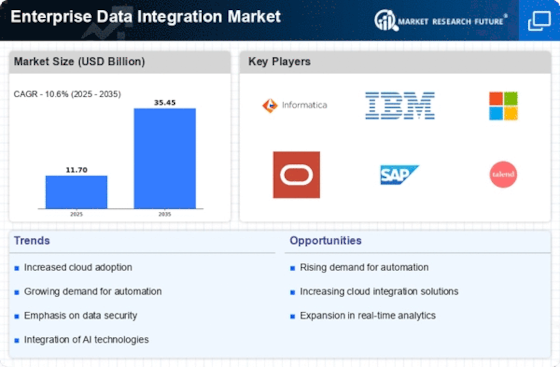Top Industry Leaders in the Enterprise Data Integration Market

Cracking the Code: Deep Dive into the Enterprise Data Integration Market's Competitive Landscape
The enterprise data integration market is an engine driving digital transformation. As organizations accumulate data from diverse sources, effectively integrating it becomes crucial for gaining insights, making informed decisions, and streamlining operations. This multi-billion dollar market is a battleground, with established players and nimble newcomers vying for dominance. Let's dissect the key players, their strategies, and the factors shaping this dynamic landscape.
Key Players:
- IBM Corporation (US)
- Microsoft Corporation (US)
- Oracle Corporation (US)
- SAP SE (Germany)
- SAS Institute Inc. (US)
- Informatica Corporation (US)
- Talend Inc. (US)
- Cisco Systems, Inc. (US)
- Information Builders Inc. (US)
- Actian Corporation (US)
- Syncsort Incorporated (US)
- Pitney Bowes Inc. (US)
- Denodo Technologies (US)
- Attunity Ltd. (US)
- HVR Software Inc. (US)
Strategies Adopted:
-
Hybrid Models: Recognizing the cloud's potential, established players are adopting hybrid solutions, offering both on-premise and cloud-based options. This caters to customers with varying needs and comfort levels with cloud migration.
-
AI and Machine Learning Integration: Players are incorporating AI and ML capabilities into their platforms for automated data mapping, transformation, and anomaly detection. This enhances efficiency, reduces manual effort, and improves data quality.
-
API-Driven Ecosystems: Open APIs and pre-built connectors are crucial for seamless integration with diverse applications and data sources. This expands platform capabilities and caters to a wider range of use cases.
-
Compliance Focus: Stringent data privacy regulations like GDPR and CCPA are driving demand for compliant data integration solutions. Players are actively acquiring certifications and highlighting their data security measures to attract privacy-conscious organizations.
Factors for Market Share Analysis:
-
Product Breadth and Depth: The range of data sources, transformation capabilities, and target platforms supported by the platform directly impact market share.
-
Deployment Flexibility: Whether the platform offers on-premise, cloud, or hybrid options influences its appeal to different customer segments.
-
Ease of Use and Scalability: Intuitive interfaces, pre-built connectors, and flexible scaling options are crucial for adoption and attracting broader customer bases.
-
Data Security and Compliance: Robust data security features, compliance certifications, and transparent data handling practices are essential for building trust and attracting security-conscious organizations.
-
Pricing Strategies: Flexible pricing models, including subscription options and tiered pricing based on usage, are crucial for competing in a cost-sensitive market.
New and Emerging Companies:
Several startups are shaking up the market with innovative solutions. Databricks (US) leverages a unified data platform for integration, analytics, and machine learning. Unifi (US) focuses on real-time data integration for operational analytics. The future of EDI might lie in self-service data integration tools and solutions for integrating unstructured data sources like social media and IoT.
Current Investment Trends:
Venture capital firms are actively investing in promising startups in the EDI space. AI-powered data integration, real-time analytics platforms, and data security solutions are attracting significant investments. Established players are also acquiring smaller companies with disruptive technologies to bolster their offerings and stay ahead of the curve.
Latest Company Updates:
October 26, 2023: Talend, a leading cloud data integration platform provider, announces its acquisition of Hevo Data, a cloud-based data warehouse loader, to strengthen its cloud data integration offerings.
November 09, 2023: Microsoft unveils Azure Data Factory v2, featuring enhanced capabilities for data ingestion, transformation, and orchestration across hybrid and multi-cloud environments.
December 14, 2023: IBM expands its cloud-based data integration platform, IBM iDataFabric, with new AI-powered features for data quality management and governance.










